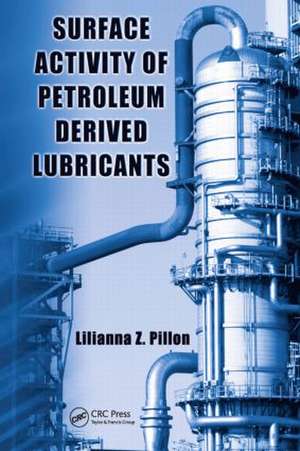Surface Activity of Petroleum Derived Lubricants
Autor Lilianna Z. Pillonen Limba Engleză Hardback – 6 oct 2010
Using 300 tables to provide experimental data from books, journals, and the patent literature, this practical and comprehensive reference examines:
- the refining of lube oil base stocks
- the chemistry of additives
- the formulation technology of lubricants
- the performance of the most important finished products such as turbine oils, hydraulic fluids, and engine oils
Preț: 1551.92 lei
Preț vechi: 1892.58 lei
-18% Nou
Puncte Express: 2328
Preț estimativ în valută:
296.100€ • 308.92$ • 245.19£
296.100€ • 308.92$ • 245.19£
Carte tipărită la comandă
Livrare economică 14-28 aprilie
Preluare comenzi: 021 569.72.76
Specificații
ISBN-13: 9781439803400
ISBN-10: 1439803404
Pagini: 362
Ilustrații: 373 tables and 1
Dimensiuni: 156 x 234 x 25 mm
Greutate: 0.66 kg
Ediția:New.
Editura: CRC Press
Colecția CRC Press
ISBN-10: 1439803404
Pagini: 362
Ilustrații: 373 tables and 1
Dimensiuni: 156 x 234 x 25 mm
Greutate: 0.66 kg
Ediția:New.
Editura: CRC Press
Colecția CRC Press
Public țintă
Researchers and professionals in the fuel and petrochemical industries.Cuprins
Conventional Refining of Crude Oils..Nonconventional Processing of Base Stocks. Low Temperature Fluidity of Base Stocks. Oxidation Stability of Base Stocks. Interfacial Properties of Base Stocks. Lubricant Formulation. Effects of Additives on Surface Activity of Turbine Oils. Effects of Base Stocks on Surface Activity of Hydraulic Oils. Surface Activity of Engine Oils. Additive Interactions. Scope and Limits of Lubricant Testing. Lubricant Storage.
Notă biografică
Lilianna Z. Pillon received her MSc in chemistry from the University of Lodz, Poland, and her PhD from the University of Windsor, Canada. She was awarded a National Research Council (NRC) of Canada Postdoctoral Fellowship and studied polymer blends at the NRC Industrial Materials Research Institute in Boucherville, Quebec. She joined Polysar Ltd., Latex R&D Division, where she developed an interest in polymer emulsions and chemical interactions. She also worked for Imperial Oil, Research Department, where she developed an expertise in the base stock processing and quality followed by work in the industrial oil group and the engine oil group. She was awarded patents related to the interfacial properties of lube oil base stocks and the use of surface active additives. She is the author of the book Interfacial Properties of Petroleum Products published by CRC Press in 2007.
Descriere
Hundreds of lubricant additives are available industry-wide to improve base stock properties and protect metal surfaces; however, the wrong combination of these commodities can result in substandard performance. This volume explains how surface activity is affected by several factors: the interfacial properties of lube oil base stocks at oil/surface interfaces, lubricant solvency properties, additive interactions, and variations in temperature. The book provides an understanding of these factors that will influence proper selection of base stocks and additives necessary for resisting foaming and air entrainment, inhibiting rust and corrosion, preventing wear, and controlling emulsification and demulsification.






